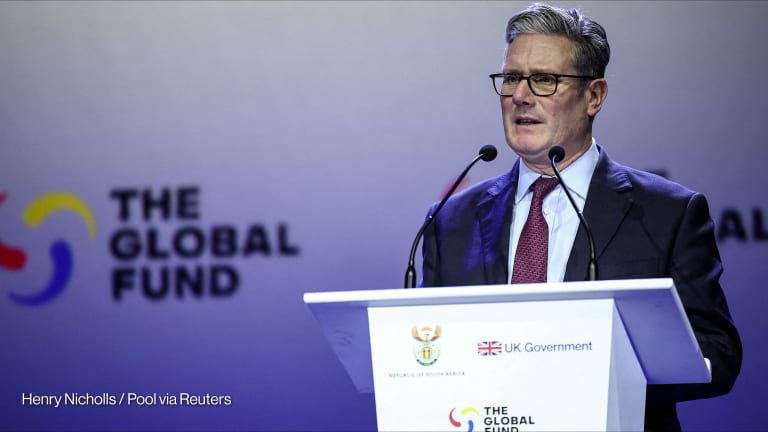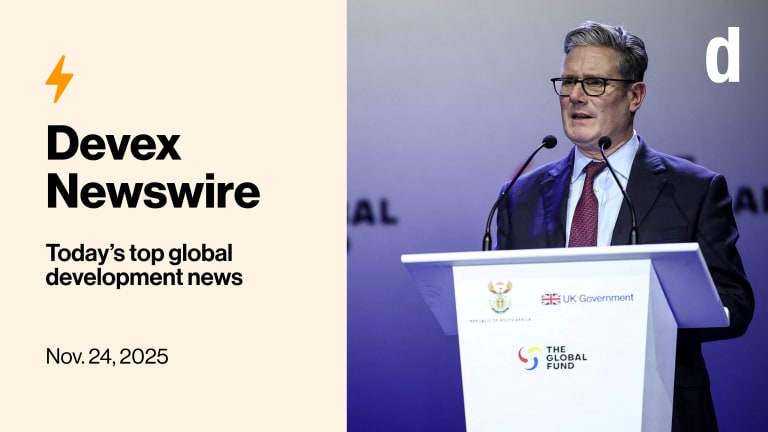A virtual pledging conference? Venezuela could be first
There is no precedent for hosting a major pledging event online, but many Latin American countries are in urgent need of assistance to support Venezuelan migrants and refugees.
WASHINGTON — A pledging conference to support Venezuelan refugees and migrants, originally scheduled alongside the World Bank’s Spring Meetings in Washington this week, is postponed as organizers work out a way to host it virtually. The World Bank gathering, an April event that brings together bank employees, formal country delegations, and a who’s who of worldwide development officials — over 10,000 people in total — was moved to a virtual format this year due to the COVID-19 pandemic. As its meetings proceed online this week, the pledging conference that was intended to raise much-needed funds for the countries hosting Venezuelans remains on hold. William Spindler, senior external engagement coordinator at UNHCR’s Regional Bureau for the Americas, said there is no precedent for hosting a major pledging event online. “I don’t think it’s been done before. … It would be the first one,” Spindler said. “There’s nothing concrete. It’s all up in the air.” The European Union and Spanish government have expressed interest in coordinating the event along with UNHCR and the International Organization for Migration. They are working to determine a time frame, Spindler said, adding that the sooner it can be held, the better. The EU announced on Wednesday morning that it would also host an online pledging event for COVID-19 in early May. “With all the needs that there are now with COVID,” Spindler said, “it’s clear that there will be many priorities and many of the traditional donors will have a lot of demands.” Last year, UNHCR, IOM, and the European Union co-hosted a solidarity conference in Brussels for countries supporting Venezuelan refugees and migrants, but the money announced there largely consisted of existing commitments. The idea to host a formal pledging conference to secure additional funds, Spindler said, grew out of that event. “With all the needs that there are now with COVID, it’s clear that there will be many priorities and many of the traditional donors will have a lot of demands.” --— William Spindler, senior external engagement coordinator, UNHCR Regional Bureau for the Americas Many of the countries hosting Venezuelans are considered middle-income, but Spindler said they are still in need of assistance to provide safety nets to migrants and refugees and to facilitate access to services such as education, health care, and formal employment. Nearly 5 million people have fled Venezuela, many traveling by foot to neighboring Colombia and Brazil, as well as to Ecuador, Peru, and elsewhere across South America. Colombia is hosting an estimated 1.6 million Venezuelans and had remained committed to keeping its border open to allow free movement before official crossings were closed last month to slow the spread of COVID-19. Despite Colombia’s generosity, President Iván Duque has said his country cannot shoulder the response to the refugee crisis alone and has frequently called on the international community to provide more financial support. On Monday, Colombia released a document outlining a six-point plan for continuing support to migrants during the COVID-19 pandemic, as the country remains on lockdown and many Venezuelans have lost work in the informal economy. “We are issuing a new call to the international community to secure more resources to respond to Venezuelan migrants in Colombia,” said Felipe Muñoz, adviser to Duque on border issues. “Colombia has shown solidarity in our response and has followed international standards. We require the international community to continue this process.” European donors in particular have shown less interest in the Venezuela crisis, while the U.S. has given more than $250 million to help Colombia support Venezuelans. “When we compare what the migrants have received in the midst of this crisis in Venezuela, it doesn’t get to $200 per migrant,” Duque said Tuesday, appearing from Bogotá in an online event. “When you compare that to Syria, it’s something compared to almost $2,000 per migrant. We have taken most of the burden. The same situation is happening in Ecuador, in Chile, and in Peru.” The virtual appeal would not raise money for the response inside Venezuela — which is suffering from political unrest, record-high inflation, and a collapsed health care system. Instead, the funds would go to support countries hosting Venezuelans, as well as U.N. agencies. UNHCR and IOM lead on support to Venezuelan refugees and migrants, while the United Nations Office for the Coordination of Humanitarian Affairs heads up humanitarian response inside the country. “Latin America has responded for several years now … by accepting refugees and migrants from Venezuela by basically giving them access to health, to education, to the labor market, and by fairly successfully integrating large numbers of them,” Spindler said. “It’s difficult for these countries to continue doing what they have been doing so far. Our job is to make the case and to show that this is not sustainable, that these countries cannot continue — especially now, with the impact of COVID.” The 2020 Regional Refugee and Migrant Response Plan for Refugees and Migrants from Venezuela is being revised in light of the coronavirus, Spindler said. The plan’s funding request will reflect extra needs that pledging conference organizers hope can be met during the virtual event, such as health assistance. It will also shift some priorities originally planned for 2019 to next year. Middle-income countries don’t qualify for some traditional types of development assistance, even though they may be in need of infrastructure investments to better support the influx of Venezuelans. The intention would be to raise additional funds outside the RMRP to finance the construction of hospitals, schools, and roads, among other projects, which would likely come in the form of loans from institutions such as the World Bank, Spindler said. A spokesperson for the World Bank’s Latin America and the Caribbean department declined to comment on any potential role that the bank would play in helping organize a virtual pledging conference or any commitments it may make. “Realistically, I don’t think it can happen before May,” Spindler said of the conference. “Even then, it would take a lot of work to have it ready. But again, we don’t want to wait too long.”
WASHINGTON — A pledging conference to support Venezuelan refugees and migrants, originally scheduled alongside the World Bank’s Spring Meetings in Washington this week, is postponed as organizers work out a way to host it virtually.
The World Bank gathering, an April event that brings together bank employees, formal country delegations, and a who’s who of worldwide development officials — over 10,000 people in total — was moved to a virtual format this year due to the COVID-19 pandemic. As its meetings proceed online this week, the pledging conference that was intended to raise much-needed funds for the countries hosting Venezuelans remains on hold.
William Spindler, senior external engagement coordinator at UNHCR’s Regional Bureau for the Americas, said there is no precedent for hosting a major pledging event online.
This story is forDevex Promembers
Unlock this story now with a 15-day free trial of Devex Pro.
With a Devex Pro subscription you'll get access to deeper analysis and exclusive insights from our reporters and analysts.
Start my free trialRequest a group subscription Printing articles to share with others is a breach of our terms and conditions and copyright policy. Please use the sharing options on the left side of the article. Devex Pro members may share up to 10 articles per month using the Pro share tool ( ).
Teresa Welsh is a Senior Reporter at Devex. She has reported from more than 10 countries and is currently based in Washington, D.C. Her coverage focuses on Latin America; U.S. foreign assistance policy; fragile states; food systems and nutrition; and refugees and migration. Prior to joining Devex, Teresa worked at McClatchy's Washington Bureau and covered foreign affairs for U.S. News and World Report. She was a reporter in Colombia, where she previously lived teaching English. Teresa earned bachelor of arts degrees in journalism and Latin American studies from the University of Wisconsin.








